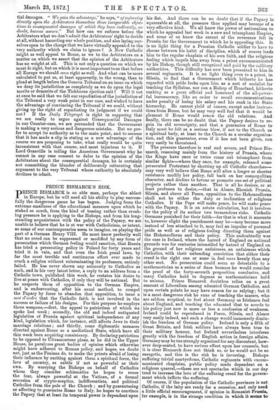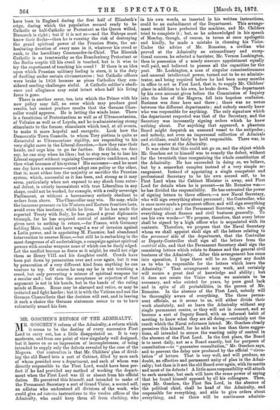PRINCE BISMARCK'S RISK.
PRINCE BISMARCK is an able man, perhaps the ablest in Europe, but he will need all his ability to play success- fully the dangerous game he has begun. Judging from the extreme smallness of the educational measure upon which he staked so much, from the kind of teasing rather than crush- ing pressure he is applying to the Bishops, and from his long- standing acquaintance with the policy of the Papacy, we are unable to believe that he is at war with Catholicism, or intent, as some of our contemporaries seem to imagine, on playing the part of a German Henry VIII. He must know perfectly well that no creed can be suppressed or modified by any form of persecution which German feeling would sanction, that Russia has tried a persecuting policy in Poland for forty years and tried it in vain, and that even the Irish penal laws, by far the most terrible and continuous effort ever made to crush a religion without exterminating its professors, entirely failed. He has never shown any animosity to Catholics as such, and in his very latest letter, a reply to an address from a Catholic town, published this week, he restates his desire to live at peace with Catholics, if only they will be national. But he suspects them of opposition to the German Empire, and is endeavouring, after his usual method, to compel the Papacy by force to abandon that opposition, to issue a mot d'ordre that the Catholic faith is not involved in the success or failure of his designs. For this purpose he employs three weapons,—first, the appeal to patriotism of which we spoke last week ; secondly, the old and indeed antiquated legislation of Prussia against spiritual independence of any kind, legislation which, for instance, still affects Jews in their marriage relations ; and thirdly, some diplomatic menaces directed against Rome as a mediatized State, which have all this week been acquiring consistency. By declaring patriotism to be opposed to Ultramontane plans, as he did in the Upper House, he paralyzes great bodies of opinion which otherwise might have adhered to Roman policy, and hopes, we doubt not, just as the Fenians do, to make the priests afraid of losing their influence by exciting against them a spiritual force, the love of country, as subtle if not as powerful as their own. By worrying the Bishops on behalf of Catholics whom they consider schismatics he hopes to rouse the fear, always powerful at the Vatican, of a formal secession of crypto-sceptics, indifferentists, and political Catholics from the pale of the Church ; and by guaranteeing or affecting to guarantee Rome to Italy, he hopes to convince the Papacy that at least its temporal power is dependent upon his fiat. And there can be no doubt that if the Papacy is squeezable at all, the pressure thus applied may become of a very effective kind. We all know the power of nationalism to which he appealed last week in a new and triumphant Empire,. and some of us know the extent of the reverence felt in Prussia for the Government to which he is appealing this. It is no light thing for a Prussian Catholic soldier to have to choose between his habit of discipline, which of course leads him to the regular chaplain of his own faith, and the religions feeling which impels him away from a priest excommunicated by his Bishop, though still recognized and paid by the military' authorities. This difficulty has now been presented to him in several regiments. It is no light thing even to a priest, in Silesia, to find that a Government which hitherto he has regarded with pride looks upon him as a sort of socialist for teaching the Syllabus, nor can a Bishop of Ermeland, hitherto ranking as a great official and honoured of the all-power- ful bureaucracy, like an order to recall excommunications under penalty of losing his salary and his rank in the State hierarchy. He cannot yield of course, except under instruc- tions from Rome, but he may very well feel that it would be pleasant if Rome would renew the old relations. And finally, there can be no doubt that the Papacy desires to re- gain its old sovereignty, and that a guarantee of Rome to Italy must be felt as a serious blow, if not to the Church as a spiritual body, at least to the Church as a secular organiza- tion, and this guarantee, even if it has not been given, can very easily be threatened.
The pressure therefore is real and severe, and Prince Bis- marck, reasoning mainly from the history of Prussia, where the Kings have once or twice come out triumphant from similar fights—where they once, for example, released some persecuted Protestant by shutting up all Catholic churches— may very well believe that Rome will after a longer or shorter resistance modify her policy, fall back on her cosmopolitan character, and decline to favour or promote one set of political projects rather than another. That is all he desires, or at least professes to desire,—that in Alsace, Rhenish Prussia, Silesia, and above all Posen, opposition to the Hohenzollerns shall not be either the duty or inclination of religions Catholics. If the Pope will make peace, he will make peace with the Papacy. It is an astute calculation, but it involves for the policy of its author two tremendous risks. Catholic Germans punished for their faith—for that is what it amounts to, however slight the punishment may be—may become more instead of less attached to it, may feel an impulse of personal pride as well as of religions feeling directing them against the Hohenzollerns and their policy. This undoubtedly was the case in Ireland, where the hatred of England on national grounds was for centuries intensified by hatred of England on the ground of her religious unfairness, an unfairness which Catholics, with their unbending conviction that either their creed is the right one or none is, feel more keenly than any other sect. No persecution could seem so detestable to a mathematician as a series of fines because he would consider the proof of the forty-seventh proposition conclusive, and many Catholics hold to dogmas as mathematicians hold to axioms. Prince Bismarck doubtless relies on a great amount of Liberalism among educated German Catholics, and upon certain points he may have reason for so relying ; but it is a most dangerous risk he runs of teaching the masses, who are seldom sceptical, to feel about Germany as Irishmen feel about England, and teaching the educated that to accede to his policy just now is more or less a confession of weakness. Ireland could be reproduced in Posen, Silesia, and Alsace very easily indeed, and such a change would immensely dimin- ish the freedom of German policy. Ireland is only a fifth of Great Britain, and Irish soldiers have always been true to
their military honour, but Ireland nevertheless interferes greatly with the freedom of English action in foreign affairs. Germany may be too strongly organized for any discontent, how- ever deep-seated, to have serious effect upon her counsels, but it is clear Bismarck does not think so, or he would not be so energetic, and this is the risk he is incurring. Bishops
suffering trivial martyrdoms, Catholic regiments with excom- municated chaplains, public policy made dependent on a
religious quarrel,—these are not spectacles which in our day tend to increase the love of the suffering creed for the govern- ment which inflicts the suffering.
Of course, if the population of the Catholic provinces is not Catholic, if the laity are ready for a secession, and only need a little official encouragement, if opinion in Romanist Prawns, for example, is in the strange condition in which it seems to
have been in England during the first half of Elizabeth's reign, daring which the population seemed ready to be Catholic or half-Catholic or Protestant as the Queen willed, Bismarck is right ; but if it is not so—and the Bishops must know their flocks—then he is running the risk of destroying the grand spiritual power of the Prussian State, the un- hesitating devotion of every man in it, whatever his creed or rank, to the hereditary Commander-in-Chief. The Rhenish Catholic is as trustworthy as the Brandenburg Protestant or the Berlin sceptic till his creed is touched, but is it wise to try the experiment of touching his creed ? If there is an idea upon which Prussian military feeling is stern, it is the duty of duelling under certain circumstances ; but Catholic officers were broke in 1858 because as pious Catholics they con- sidered sending challenges sinful. A Catholic soldier's obedi- ence and allegiance may exist intact when half his living force is gone.
There is another error, too, into which the Prince with his new policy may fall, an error which may produce good results, but cannot produce results that the German Chan- cellor would approve. He is letting the winds loose. There is a fanaticism of Protestantism as well as of Ultramontanism, of Voltaire as well as of Loyola, and he is administering strong stimulants to the former, stimulants which tend, at all events, to make it more hopeful and energetic. Look how the Democratic Town Councils, to whom Tory pietism is quite as distasteful as Illtramontane rigidity, are responding to his very slight move in the Liberal direction,—how they raise their heads, and urge him to go far further. He thinks, we dare say, he can stop when he likes ; but to stop may be to lose his Liberal support without regaining Conservative confidence, and then what becomes of his system ? His successor—and he must one day have a successor—must adopt one policy or the other, that is, must either lose the majority or sacrifice the Prussian system, which, successful as it has been, and strong as it may seem, particularly when not exposed to any shock from exter- nal defeat, is utterly inconsistent with true Liberalism in any shape, could not be worked, for example, with a really sovereign Parliament, or without a bureaucracy entirely obedient to orders from above. The Chancellor may win. He may, while the immense pressure on his Western and Eastern frontiers lasts, avoid-even this tendency, while he lives. If he has made the reported Treaty with Italy, he has gained a great diplomatic triumph, for he has acquired control of another army and given next to nothing in return,—for France, with Germany holding Metz, could not have waged a war of invasion against a Latin power, and in appointing M. Fournier, had abandoned intervention to recover Rome,—but still he is embarking in the most dangerous of all undertakings, a campaign against spiritual powers with secular weapons none of which can be finely edged. Let the conflict become as fierce as it might, he could not edge them as Henry VIII. and his daughter could. Creeds have been put down by persecution over and over again, but it was by persecution of a very different kind from anything he can venture to try. Of course he may say he is not touching a .creed, but only preventing a misuse of spiritual weapons for a secular end ; but then the acceptance or rejection of that argument is not in his hands, but in the hands of the ruling minds at Rome. Rome may be alarmed and retire, or may be irritated and fight harder; but it is with the Vatican and not the German Chancellerie that the decision will rest, and in leaving it such a choice the German statesman seems to us to have voluntarily armed his foes.



































 Previous page
Previous page